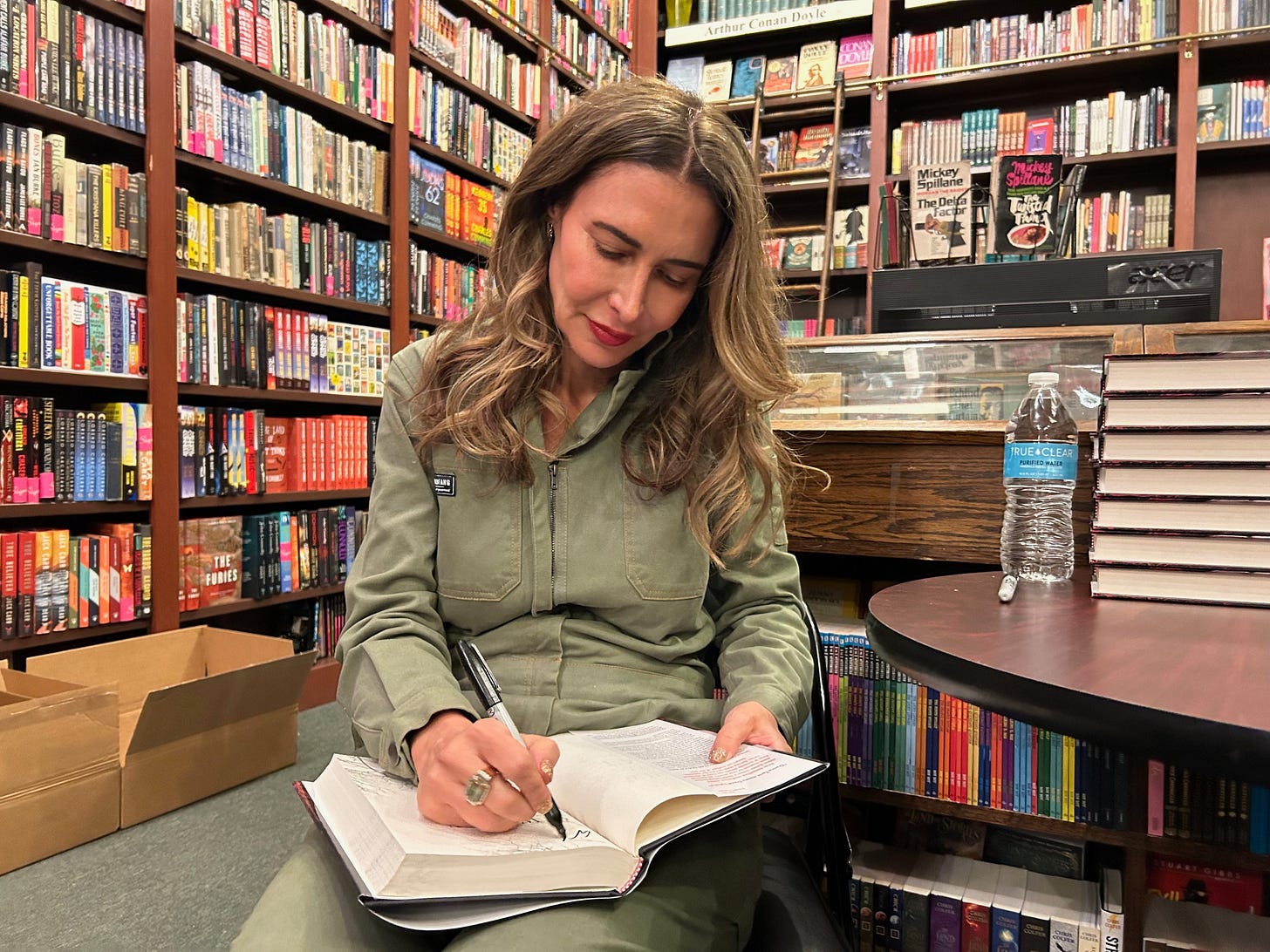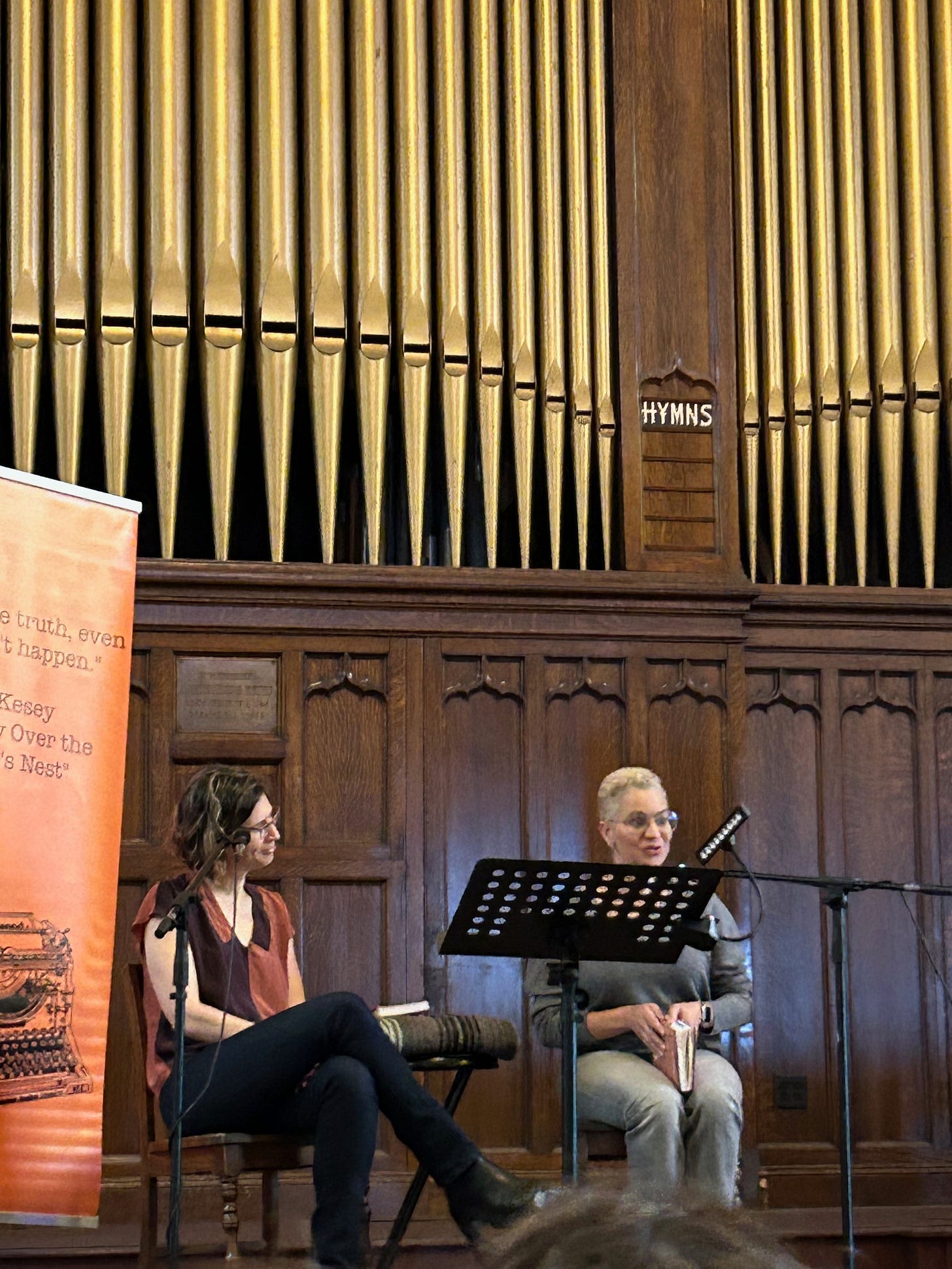Hi friends,
I’m experimenting with not explaining myself after an absence. So: I’m back! I’ve got a one-day afternoon workshop coming up from the Miami Book Fair for the Miami Big Read this spring: Family Stories We (Tell Ourselves We) Can’t Tell. I taught the subject in my extended Writing About Ancestor Trouble class, and I’m looking forward to offering this small stand-alone event, which will be held in Miami on March 16 from 1-3 pm, is limited to 15 students, and is priced at $30, for affordability, with a scholarship available.1 You can register on the Book Fair site.
The Miami Big Read pick this year is Madeline Miller’s epic and propulsive yet intimate second novel, Circe, with its themes of family and finding your voice and magic in the aftermath of trauma and amid estrangement when your parents are actual gods. Teaching the class is especially exciting because I grew up in the 305 and because I had the honor of interviewing Madeline at the launch of her gut-wrenching first novel, The Song of Achilles, at McNally Jackson all the way back in 2012. So the class will be a homecoming and an honor for me. I’ve got more stuff in the works; timing depends on my writing deadlines and other commitments.
After some reflection on what I’m doing here in this newsletter and what I’d like to be doing more of, I’m planning send it twice monthly. One dispatch will be this freeform kind you’ve been used to, and the other will be a new Art and Kinship series around an author or other artist, their body of work, and how their biological, adoptive, or imaginative ancestors, or other understandings of kinship, influence their art. Sometimes I’ll talk with the authors, sometimes not. First up: Emily Raboteau, later this month, followed by Garrard Conley in March. Both have new books I loved coming out next month.
If you’re wondering: keeping this newsletter free is part of the way I keep engaging with the concerns I wrote about in Ancestor Trouble, and connecting with people who are earnestly grappling with those questions. At the moment I don’t have plans to introduce a paywall.
Twinship mysteries and philosophy
I interviewed
about her first novel, Where You End, on an icy evening in Manhattan, and there she is above, signing preorders in style at the Mysterious Bookshop. The novel was inspired by Abbott’s mom and her mom’s sister, who are not merely identical twins but mirror twins, and by the true story of a man who remembered nothing after coming out of a coma except the name of the twin brother who went on to invent a fake history and trick the poor coma-surviving brother with it. Abbott and I talked about genetics and epigenetics and twins and the ‘80s and the ‘70s and the fact that Abbot discovered while writing the novel that the man who raised her (also an identical twin) is not her biological father! (Yes, I want her to write a memoir.) Where You End touches on so many mysteries of twinship, and also takes the reader back into the midst of an Est-like cult run by some gross men and the twins’ mother during their childhood in the 1970s.More on twins:
“Much of the experience of twinhood is determined not by twinhood itself but the response of non-twins to it,” philosopher and identical twin Helena de Bres writes in the introduction to her book, How to Be Multiple: The Philosophy of Twins. Writer Anne Hellman (also a twin) says the book is a perfect framework for reexamining “some of the biggest existential problems of our time.”
“Is Fashion in Your Genes?” Fascinating story by Erika Hayasaki of twin sisters born in Korea and separated as infants “grew up an ocean apart but with the same penchant for style.”
A podcast on “Adoption, Twins and the Genetics of Personality” features a researcher (a twin) who’s studied “hundreds of sets of twins and adopted siblings” over the years and focuses on the ways “genes and the environment work together” over a life. (If you’re interested in these kinds of questions, Tim Spector’s Identically Different is a deeply interesting book, steeped in years of twin studies that persuaded him that our genes are not destiny.)
Doppelgänger athletes with the same name, constantly asked if they were twins, took a DNA test to be sure they weren’t long-lost siblings. (They aren’t related.)
Soul nourishment
I’ve read two books multiple times for creative and soul nourishment recently. The first is Idra Novey’s Take What You Need, a novel from the perspective of a translator and stepdaughter and her semi-estranged stepmother, a tough, opinionated, contentious but fiercely loving woman in rural Pennsylvania with the soul of an artist, who dies suddenly and leaves the stepdaughter her art in a moldering house on a street descending into intense poverty. I also had the pleasure of seeing the author speak with Asale Angel-Ajani at the Brattleboro Literary Festival in October. Writing this little paragraph makes me want to read the book again.
The second book, which I’ve probably mentioned before and will probably mention again, is Lucille Clifton’s perfect and slender memoir, Generations. The audiobook, equally perfect, is read by her daughter. From the memoir I arrived at Clifton’s poem, “generations,” which begins:
people who are going to be
in a few years
bottoms of trees
bear a responsibility to something
besides people
I like to remind myself that Honorée Fanonne Jeffers is working on a biography of Clifton. It’s the kind of book I console myself with anticipating when I feel particularly despairing over the state of the world.
Isotopes, elements, spirit
In South Carolina, scientists and local Black leaders are using isotopes to pinpoint the birthplaces of people who were enslaved. “To trace those origins with more precision, [the anthropologist and her team] use a tool called isotope mapping. Just as geographic regions vary in types of rocks and trees, they also have different proportions of elements.”
Some scientists say Mercury isotopes date plants’ extensive spread to the early Silurian period. Stable isotopes are also used to track bird migration and other wildlife migration and even (by consulting remains in museum exhibits) to help understand the insect apocalypse.
My friend and teacher
, a gorgeous soul in the universe, recently taught an Ancestors to Elements class—on interrelatedness between humans and our non-human kin, including the elements, from an explicitly spiritual perspective—and she’s renamed her newsletter to match.I’m relieved by the new federal regulations that require museums to obtain consent from Indigenous peoples “before displaying or performing research on cultural items.”
“A letter written by a Roman emperor [Constantine] helped lead a team of archaeologists to an ancient temple that ‘adds significant insights into the social changes’ from pagan beliefs to Christianity in the Roman Empire… [and] ‘continuities between the classical pagan world and early Christian Roman world." If you’ve read Ancestor Trouble, you might remember that this is a particular interest of mine.
On a related note, Matthew Cheney (whose writing I’ve followed since our mutual blogging days) wrote an essay, The Rats in Our Walls, about H.L. Lovecraft and Nazis and Faulkner and Donna Haraway’s Staying With the Trouble: Making Kin in the Chthulucene and much more. Among many other things, he says, “Newton herself was not especially religious as an adult, but history and ancestry opened up a kind of spirituality for her, and one of the most interesting things about Ancestry Trouble is how the narrative moves from history and science toward imagination and faith.” I’m grateful for his attention to my book and his writings overall.
Gratitude, too, to Loyalty Books’ founder and chief bookseller and general force for good in the world Hannah Oliver Depp for recommending Ancestor Trouble on The Stacks podcast as a book Joe Biden should read; to Family Tree Magazine for including Ancestor Trouble among their “essential genealogy books”; to Cari Wade Gervin at The Dog and Pony Show for recommending it as a gift for genealogy-obsessed family members (Greenlight is still selling personalized copies, if you’d like one); and to Jake Warinner for including me on his podcast.
And on the subject of spirituality, a friend (also from blog days, who shall remain nameless) recommended Matthew McNaught’s Immanuel last year, and now I am recommending it to you, especially my ex-evangelical brethren.
Honesty and connection rather than saviorism
My friend
, an editor at Simon & Schuster, has been telling me about Garrett Bucks’ The Right Kind of White: A Memoir since he acquired the book several years ago. I read an early copy and was delighted to write this blurb for it:“Garrett Bucks' The Right Kind Of White is a clear-eyed, deeply felt call for connection and community rather than individual saviorism. Bucks invites us to follow his path from a progressive childhood into a commitment to social justice work that hinged on exalting his separation from other white people. Recognizing this tendency writ large in white activist circles, Buck argues that the only way to reckon with whiteness and its harms is to give up trying to stand outside them, but to do the work for change together with other white people in a spirit of love rather condemnation.”
More in science and also things masquerading as science
Ancient roots of winter depression? From interbreeding with our ancient Denisovan ancestors, homo sapiens “appear to have inherited a genetic adaptation involved in zinc regulation that may have helped them weather the colder climates of the day — but at the same time may have been responsible for predisposing us to depression and all kinds of mental disorders.”
New discoveries in Germany reportedly show that modern humans ventured much further north 45,000 years ago than scientists realized, that they were comfortable existing alongside Neanderthals, and they mastered skills for surviving extreme cold equal to that of modern-day Siberia.
The inner ears of ancient ape skulls offer clues to how human bipedalism developed.
In Ancestor Trouble, I wrote about Parabon Labs and how they enable police departments to create (speculative and, to put it mildly, unreliable) mugshots based on DNA. Now, predictably, the police are trying run the results through facial recognition software.
And more
Above is a page from Hannah Moushabeck's children's book, Homeland: My Father Dreams of Palestine.
At the recommendation of Zaina Arafat at Vulture, I’m looking forward to watching Lemon Tree, the story of a poor Palestinian widow living in the West Bank who is blocked from tending her late father’s lemon grove.
I’ve ordered a copy of Shannon Gibney’s The Girl I Am, Was, and Never Will Be: A Speculative Memoir of Transracial Adoption because how could I not?
“Fruchter deftly braids together the narratives of four generations of women in Shiva’s family, all bound by the mystery of Judaism and queer passion. The novel moves back and forth between her contemporary characters and their ancestors... Among these forebears were messengers, badchanim, healers and spirits.”—Lauren LeBlanc reviews Temim Fruchter’s debut novel, City of Laughter.
“‘Be careful of your pronouncements, grandson,’ she answered. ‘…I have existence, whole being, in your imagination. It is but one kind of being, to be sure, but it is perhaps the best of all kinds. If I am not here in this room, grandson, then surely neither are you.’” — Joy Harjo on poet M. Scott Momaday, who died recently. I like his paintings “Death as a Child with Rose Tree” and “La Muerte.”
Mark Twain’s uncle Edward Clements was the “witchfinder general” in the Islandmagee Witch Trial in Ireland, in 1711. In 1896, Twain published Personal Recollections of Joan of Arc, the work he considered his own best, depicting the saint who “was tried for witchcraft … and burned at the stake.” I’m not saying there is a connection, but I do wonder.
Spartanburg, brilliance alert: This coming Monday, February 5, Latria Graham speaks with Crystal Wilkinson, author of Praisesong for the Kitchen Ghosts, from 6:30 - 8 pm in the Spartanburg Public Library, Headquarters Library: Barrett Room.
On Saturday the 24th in LA, my friend Susan Maddux (one of my favorite artists) is holding a textile collage workshop at her studio. Go because I can’t!
I’ll leave you with Rufus and the ball he found at the empty dog run early this week. He carried it all the way home and (after I washed it) has insisted on sleeping with it ever since.
If you’d like to attend and cost is a concern, let me know.









I'm possibly coming to Miami to see one of my mother's 95 y.o. cousins visiting from Ecuador, and if I am and it's the right dateline, I may get in touch to see if there's room in the workshop! Meanwhile, thank you for all these resources!
I'm new-ish to Substack so hadn't come across your newsletter before, but I have followed you elsewhere for many years. So glad you are writing and talking about family. I can't do the workshop but will look forward to following you now. And thank you for being free!